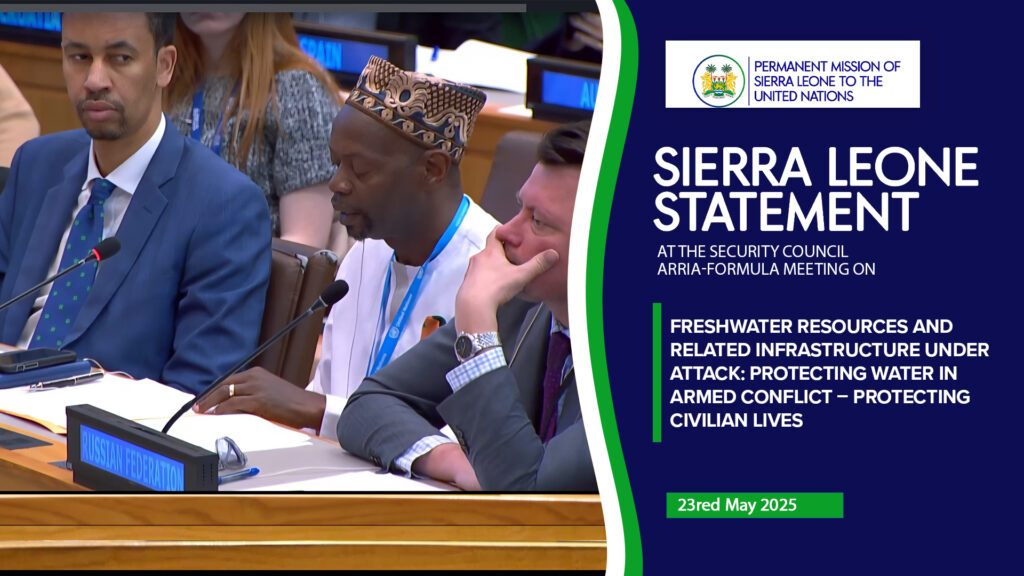STATEMENT BY
H.E. MR. KALILU IBRAHIM TOTANGI
AMBASSADOR AND DEPUTY PERMANENT REPRESENTATIVE / CHARGÉ D’AFFAIRES a.i.
Thank you, and welcome Ms. Melita Gabrič, Deputy Minister of Foreign and European Affairs of the Republic of Slovenia.
I thank Slovenia for convening this timely Arria Formula meeting which Sierra Leone is proud to co-sponsor, noting the impact of conflict on freshwater infrastructure and resources, and the environment in general.
I also thank Dr. Tedros Adhanom Ghebreyesus and Ms. Mehwash Ansari, for their insightful briefings.
Madam Chair, Colleagues,
Although international law enshrines the right to water as a fundamental human right, vital for survival, public health, and economic stability, and international humanitarian law prohibits attacks on water-related infrastructure and services, increasing disregard for civilian lives and objects continue to worsen humanitarian situations during conflict and increase the burden on States during post conflict reconstruction.
As the nexus between climate and security becomes more evident, it is critical for the Protection of Civilians (PoC) agenda to formulate and adopt practical approaches specifically aimed at upholding the right to water and protecting freshwater resources and water-related infrastructure.
Although the Security Council has highlighted the protection of civilian infrastructure and explicitly condemned the starvation of civilians as a method of warfare, highlighting the need to maintain essential services in Resolution 2417 (2018) and Resolution 2730 (2024), these commitments must now translate to meaningful, targeted and tangible actions.
We have seen the devastating results of attacks on civilian infrastructure all across the globe. These include attacks on freshwater resources and related infrastructure which are threat multipliers to the environment and public health globally, disproportionately affecting women, children, and other vulnerable groups.
In some parts of the African continent, access to safe water is not just a development issue, it is a matter of survival and peacebuilding. Across the continent, millions of people, especially in conflict-affected areas, depend on a single borehole, a shared river, or seasonal rain to meet their most basic needs. When these are destroyed or contaminated during hostilities, the entire ecosystem of life is disrupted. Health systems falter under the weight of preventable waterborne diseases. Agriculture, the backbone of many African economies, is undermined. Women and girls walk farther, at risk of sexual violence to fetch water. Additionally, families, already displaced by violence, are forced yet again to flee in search of water.
Madam Chair,
We acknowledge the efforts of various organizations like the International Committee of the Red Cross ICRC, UN Water, International Water Management Institute, Global Water Partnership among others, in promulgating strategies to address water scarcity during and beyond conflict situations.
On this note, we would like to make the following points:
First, parties to a conflict must distinguish between civilian populations and military objectives. In response to the alarming increase in flagrant violations of IHL and targeted attacks on civilians and heavily populated areas, Sierra Leone calls for swift, thorough, and independent investigations and prosecutions of these war crimes, including deliberate attacks on civilian infrastructure. We lend our full support to the Office of the Prosecutor of the International Criminal Court (ICC) and commend its continued efforts to uphold justice and accountability.
Secondly, let me highlight the importance of “water diplomacy” as proffered during one of the briefings of the Special Representative and Head of the United Nations Office for West Africa and the Sahel (UNOWAS), particularly in addressing protracted transboundary tensions in West Africa and the Sahel. Competition for this increasingly scarce resource is heightening tensions, exacerbating economic instability, and exarcerbating climate fragility within communities. In this context, Sierra Leone calls for enhanced support to improve access to water and investment in the development of water infrastructure. This is a key step in resolving conflicts and improving the resilience of communities, particularly by creating better opportunities for the youth, who are often vulnerable to recruitment and radicalization.
Finally, Sierra Leone advocates for fostering a culture of protection for water sources and the right to water through inclusive, community-driven peacebuilding approaches. Limited access to water has been a significant driver of conflict, especially in regions where scarcity and increased competition for resources exacerbate tensions, particularly among vulnerable groups such as women, girls, and forcibly displaced persons. This vulnerability, particularly to sexual and gender-based violence, underscores the urgent need for a holistic peacebuilding strategy that also addresses water scarcity. Sierra Leone urges states and international partners, including donor organizations, to align development and humanitarian efforts to meet both immediate needs and provide sustainable solutions for maintaining access to water.
Drawing from our experience, Sierra Leone successfully implemented the Women for Water and Peace (W4WP) project, a community-led initiative in partnership with the Freetown City Council, funded by the UN Peacebuilding Fund and supported by the UN Capital Development Fund (UNCDF) and the International Labour Organization (ILO). This two-year project, which ran from January 2022 to July 2024, focused on addressing community conflict and sexual violence related to equitable access to water. The project centered on empowering women in the community to take control of water sources, combining social and economic empowerment with the prevention of sexual and gender-based violence.
In closing, let me state that today’s meeting is an opportunity to discuss this complex and rapidly evolving issue. We look forward to hearing the perspectives that will be shared today in a bid to advance this important agenda during our tenure on the Council, in collaboration with like-minded states and stakeholders.
I thank you.



